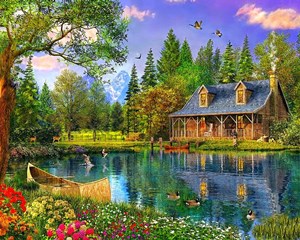Sometimes, on a higher spot of ground, a clump of trees forms an island worthy of Eden. A chaos of bush-ropes and creepers flings its garlands of gay flowers over the forest, and fills the air with the sweetest odours. Numerous birds, rivalling in beauty of colour the flowers of these hanging gardens, animate the banks of the lagoon; gaudy macaws perch on the loftiest trees; humming-birds dart with lightning speed from flower to flower-now hovering for an instant before you, as if to allow you to admire their surpassing beauty—now vanishing again with the rapidity of thought. But, as if to remind one that death is not banished from this scene of Paradise, a dark-robed vulture screeches through the woods; or an alligator, like a black log of wood or a sombre rock, rests on the dormant waters.

In these boundless forests the monkeys form much the greater part of the mammalian inhabitants; for each species, though often confined within narrow limits, generally consists of a large number of individuals. The various arboreous fruits which the savage population of these immeasurable wilds is unable to turn to advantage, fall chiefly to their share; many of them also live upon insects. They are never seen in the open savannas, as they never touch the ground unless compelled by the greatest necessity. The trees of the forests furnish them with all the food they require; it is only in the woods that they feel "at home," and secure against the attacks of mightier animals: why then should they quit them for less congenial haunts?













